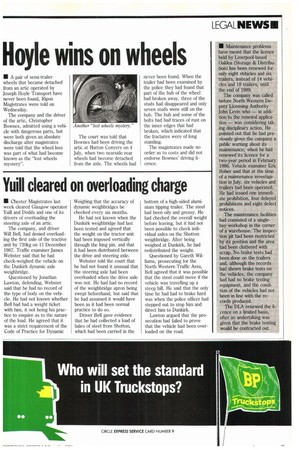Yuill cleared on overloading charge
Page 23

If you've noticed an error in this article please click here to report it so we can fix it.
• Chester Magistrates last week cleared Glasgow operator Yuill and Dodds and one of its drivers of overloading the steering axle of an artic.
The company, and driver Will Bell, had denied overloading the first axle of the tractive unit by 720kg on 11 December 1987. Traffic examiner James Webster said that he had check-weighed the vehicle on the Dunkirk dynamic axle weighbridge.
Questioned by Jonathan Lawton, defending, Webster said that he had no record of the type of body on the vehicle. He had not known whether Bell had had a weight ticket with him, it not being his practice to enquire as to the nature of the load. He agreed that it was a strict requirement of the Code of Practice for Dynamic Weighing that the accuracy of dynamic weighbridges be checked every six months.
He had not known when the Dunkirk weighbridge had last been tested and agreed that the weight on the tractor unit had been imposed vertically through the king pin, and that it had been distributed between the drive and steering axle.
Webster told the court that he had not found it unusual that the steering axle had been overloaded when the drive axle was not. He had had no record of the weighbridge apron being swept beforehand, but said that he had assumed it would have been as it had been normal practice to do so.
Driver Bell gave evidence that he had collected a load of bales of steel from Shotton, which had been carried in the bottom of a high-sided aluminium tipping trailer. The steel had been oily and greasy. He had checked the overall weight before leaving, but it had not been possible to check individual axles on the Shotton weighbridge. After being weighed at Dunkirk, he had redistributed the weight.
Questioned by Gareth Williams, prosecuting for the North Western Traffic Area, Bell agreed that it was possible that the steel could move if the vehicle was travelling up a steep hill. He said that the only time he had had to brake hard was when the police officer had stepped out to stop him and direct him to Dunkirk.
Lawton argued that the prosecution had failed to prove that the vehicle had been overloaded on the road.














































































